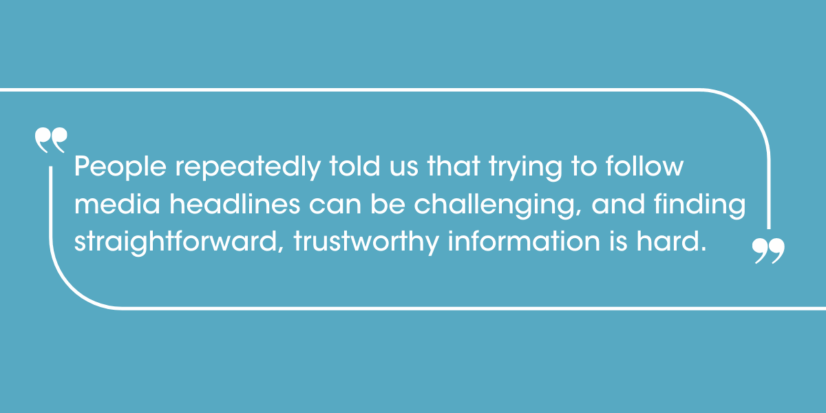
Information about assisted dying: how do we meet people’s needs and why the third sector should lead the way
Jemma Woodley, Information and Policy Officer at Compassion in Dying
At Compassion in Dying, we are led by what dying people tell us. We want people to be in control of their end-of-life decisions because there is no one better to make them. Many of the people we support say they would like the option of assisted dying, and recent research found that people who interact with our services overwhelmingly support a change in the law. That’s why we support the principle of law change for terminally ill, mentally competent adults. However, we do not campaign on assisted dying, that is the work of our sister organisation, Dignity in Dying*.
Supporting people
Our nurse-led information line supports people to make informed decisions, start honest conversations about death and dying with loved ones, and record and revisit their wishes whenever they want to. The service receives over 4,000 contacts each year and provides information, support and resources to ensure people can record their end-of-life wishes.
Currently 3% of our calls are about assisted dying. People ask us lots of different questions, from whether assisted dying can be accessed currently in the UK, to whether it’s possible to record that they would like an assisted death in certain situations in the future, in case they later lose capacity to make that decision themselves.
For some people these calls can be the first time they’ve expressed their end-of-life wishes out loud. Understandably, they can be emotional, but we listen to them without judgement. We explore how they want to live the rest of their lives, whether they have any unmet needs or symptoms that could be better managed, and we provide information and support on how they can ensure their wishes are met within the current law.
People need accessible information to make decisions that are right for them
Through supporting people to record their end-of-life wishes, we know there is often a disconnect between people’s preferences, and their knowledge of relevant law, policy, infrastructure or guidance that can support them to receive treatment and care in line with their wishes.
Over the years, we have developed information and support in order to bridge this gap.
Assisted dying proposals are being considered in parliaments across the UK and the Crown Dependencies, with legislation already passed in the Isle of Man and separate Bills covering England & Wales, Scotland and Jersey also being debated this year. Given that the experiences of the people we support too often point to gaps between policy and public understanding, we feel that knowing the information and support people need in relation to assisted dying must form part of the process of implementing any law change.
With this in mind, we asked the people we support to tell us about the information they need, both now and in the future, in relation to assisted dying. The following insights draw from the 2,331 people who responded to this survey.
People want to be able to make informed decisions about their end-of-life treatment and care.
Over half of respondents (56%) said there is currently information they would like to know about assisted dying. People want information on things like who will be eligible, a timeline for law change, how a person might access an assisted death if it becomes legal, and other end-of-life options available to them alongside assisted dying.
“[I’d want to see] a clear step by step guide from who to ask (would it be your GP/a consultant/ some type of specialist adviser etc.) right through to how would that impacts on life insurance / care packages at home / where loved ones can get advice.”
Importantly, whilst 34% of respondents said they have tried to find this information already, over half (59%) were not able to find what they needed. People repeatedly told us that trying to follow media headlines can be challenging, and finding straightforward, trustworthy information is hard.

People are worried that discussing assisted dying with their healthcare team might provoke a negative reaction
Many people said they felt confident to raise the topic of assisted dying with their healthcare team (82%). But some followed up their answer in the free text section of the survey to explain how they felt worried that raising assisted dying would provoke a negative reaction from their doctor or nurse.
People said that if assisted dying was legalised, they would want to understand the basics of the law before they felt able to raise it with their healthcare team. This included information on how ‘terminal illness’ is defined, how capacity is assessed and whether accessing assisted dying would have an impact on their chosen place of care at the end of life.
“I would want information [that] would prevent healthcare professionals derailing my own thoughts on it.”
“I’d want to know everything first, I’d need to have found out the ‘who, what, when and where’ of it before I would risk speaking to a doctor… I’d feel I was disadvantaged if I hadn’t done that.”
Additionally, if the law does change, people repeatedly said that clear information about their diagnosis, prognosis and the likely progression of their illness would support them to make an informed decision about whether accessing assisted dying is right for them.
It’s now up to us as a sector to address what people need head on
With patient power being a strong narrative throughout the 10 Year Plan for Health, providing the right information for the public about all options available to them as they approach the end of life is crucial.
We need to listen to what people want and need. This survey is just the first part of Compassion in Dying’s work on this issue. We will be using what people have told us to develop clear and accessible information both on proposed assisted dying legislation as its progresses throughout the UK and the Crown Dependencies, and in the event that the Bills ultimately pass.
As a sector, if we are to ensure people are properly supported in the event of law change, we need to begin work now to ensure that open conversations are fostered and that people have the information and support they need to talk to their healthcare team confidently.
If you or your team have questions about this research or are interested in exploring collaborative solutions to support the people you work with, we would love to hear from you. Please contact: Jemma Woodley at jemma.woodley@compassionindying.org.uk
* You can read more about how Compassion in Dying and Dignity in Dying work together.
Biography
Jemma works across the Policy and Information teams at Compassion in Dying and is responsible for conducting person-led research on end-of-life decision-making. She has a background in care work and holds a MSc in Mental Health Ethics and Law from King’s College London where she developed a particular interest in mental capacity law.